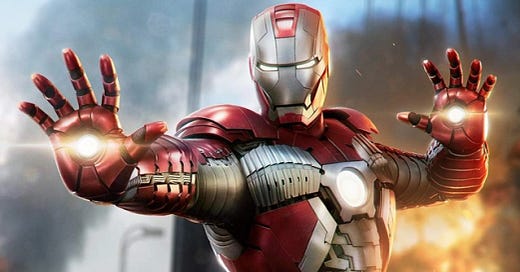The home for great culture
ok: more commentary on “all the nerds are dead.” responds to my response (linked). i think i share very little of scott’s approach or worldview, but he’s very fun to argue with. unfortunately, the debate is now edging into the territory of what makes things good, whether it’s all just bourdieusian games with cultural capital, or whether there are some actually important distinctions to be made. this is a very big topic! possibly too big for me to do justice to here, although i do plan to return to it at much, much greater length in the future.
for the moment, though, scott raises an interesting argument. i like the mabinogion; i do not like ant-man and the wasp: quantumania. why? scott imagines that some highly competent literary forger, possibly me, translates the ant-man movie into medieval welsh, modifying all its concepts as necessary, and inserts it into a collection of celtic myths. would a reader with a good level of literary taste find it noticeably worse than the others? he outlines four possible ways i might respond to this idea:
Take it at face value; maybe Sam expects the taste-having person would have this opinion, and if they didn’t, he would retract his claim that the Mabinogion is higher-quality than Ant-Man.
Admit that it would be indistinguishable from other myths, but say that the quality of the Mabinogion is in the style, language, and pacing, not the plot (but most English-speakers enjoy the Mabinogion in translation or summary; does that detract from this claim?)
Admit that it would be indistinguishable from other myths, but say that the amount of violence you would have to do to the Ant-Man plot to make it sound like a Welsh myth would essentially involve writing a completely different story which had only a vague relationship to MCU, and for all we know maybe that completely different story would be high-quality.
Admit that it would be indistinguishable from other myths, but say that the “quality” of the Mabinogion comes from something outside the text, like the fact that it’s old, or that it inspired a nation, or that it takes effort to engage with.
i had to think about this! and i think, on reflection, my answer is number 3.
my objection to ant-man and the wasp: quantumania is not that it’s about a man who has the ability to make himself very small. i am, broadly, neutral-to-positive about stories about people who can become very small. as i wrote in the original piece, there’s some actual potential in the film’s conceit; i can imagine a borges or a krzhizhanovsky doing something great with the idea of a man who shrinks into quantum spaces. (these themes are also not new. the first branch of the mabinogi is about a man who travels into annwn, the other world, to exchange places with its king.) but in the film, that potential is squandered, and it could only be squandered, because this film is first and foremost a branded product, on a factory line of other branded products. its role isn’t to be itself, as a creative work; its role is to provide a generically marvel-like experience. these things are bad not because a particular type of story is bad, but because a particular mode of cultural production is incapable of making anything good.
i think the comparison with medieval folktales is interesting, because both medieval folktales and marvel movies are outside the ‘normal’ process of cultural production. it’s very easy to compare nerd culture with great works of film or literature, and point out that nerd culture is made by committee, lacking any singular, meaningful artistic vision. this is how we usually judge culture. but oral literature doesn’t have that either! both marvel and the mabinogion are, in a sense, written by algorithms—except in folktales it’s an evolutionary algorithm, which shapes these stories over decades and centuries, through countless tellers before they’re written down. and in folktales, i think the active principle is a kind of serious joy in the telling of these tales; the pleasure of words crafted well. it’s impossible to read them without getting a sense of that joy.
in the mabinogion, there’s the tale of peredur son of efrawg, which contains a very early version of the grail myth. the story is, frankly, a mess; peredur just wanders around having various adventures for reasons that are sometimes quite hard to decipher. but sometimes, you get a passage like this:
And in the evening he entered a valley, and at the head of the valley he came to a hermit’s cell, and the hermit welcomed him gladly, and there he spent the night. And in the morning he arose, and when he went forth, behold a shower of snow had fallen the night before, and a hawk had killed a wild fowl in front of the cell. And the noise of the horse scared the hawk away, and a raven alighted upon the bird. And Peredur stood, and compared the blackness of the raven and the whiteness of the snow, and the redness of the blood, to the hair of the lady that best he loved, which was blacker than jet, and to her skin which was whiter than the snow, and to the two red spots upon her cheeks, which were redder than the blood upon the snow appeared to be.
death and desire and the rich strangeness of the world. i think it would be very hard to write a version of ant-man and the wasp quantumania that read like this. but if you did, it wouldn’t really be a marvel movie any more.


